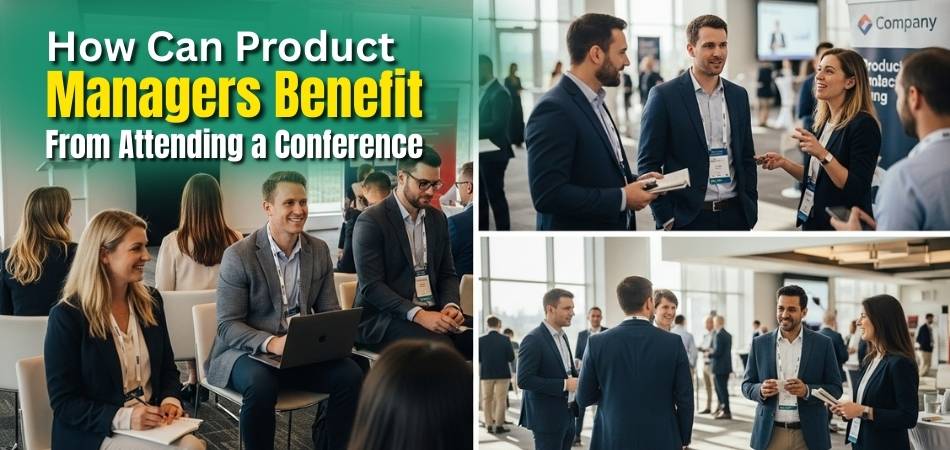Conferences are great places to learn and grow. For product managers, they give a chance to hear new ideas, pick up useful skills, and get inspired. These events bring together many people, like designers and developers, making it easy to build helpful connections. They also keep product managers up to date with the latest trends.
So, how can product managers benefit from attending a conference?
Product managers benefit from conferences by learning new skills, hearing expert advice, and getting fresh ideas. They meet other people, like designers and developers, to build helpful connections. Conferences also help them stay updated with trends, improve their work, and grow their careers with better knowledge and confidence.
Want to know more? Let’s look at the main benefits in the rest of this article.
How Can Product Managers Benefit From Attending a Conference?
The purpose of attending a conference goes beyond listening to speakers. It is about learning, sharing, and growing together. Product managers find fresh insights, build stronger networks, and find inspiration. These events create real opportunities to sharpen skills, gain confidence, and grow careers. Here are some ways product managers can benefit from the conference:
Staying Updated With Industry Trends
Conferences allow product managers to learn about market changes and new practices. They hear from experts who share proven strategies. These insights help managers understand what is shaping customer needs. Staying current ensures they can keep products competitive and relevant.
Industry trends change quickly and demand attention. Managers who attend conferences adapt more effectively to these changes. Learning directly from leaders gives them confidence. This knowledge prepares them to make smarter product decisions for the future.
Learning Proven Strategies and Methods
Expert talks and case studies provide practical lessons for product managers. These examples show what works in real projects. By listening, managers gain strategies they can adapt to their own challenges. Proven methods reduce guesswork and build smarter processes.
Workshops often explain strategies in step-by-step detail. Managers leave with specific tools they can use immediately. These proven techniques boost confidence and encourage better teamwork. The result is more effective product development cycles and stronger outcomes.
Gaining Fresh Inspiration and Motivation
Conferences expose product managers to new ideas and success stories. These experiences ignite creativity and encourage fresh perspectives. Inspiration from industry leaders motivates managers to push boundaries. Exposure to different views can reshape how they approach product challenges.
Hearing inspiring journeys from others builds energy. Managers return to their teams with renewed passion and ideas. That energy motivates others and strengthens collaboration. Inspiration drives continuous improvement and helps managers aim higher in their roles.
Improving Skills through Hands-on Learning
Many conferences include interactive workshops and training sessions. Managers practice applying strategies in realistic scenarios. This hands-on approach ensures they learn by doing, not just by listening. Active learning deepens understanding and strengthens important skills.
Practical training sessions often focus on real-world product challenges. Managers practice solving problems with expert guidance. This builds confidence and improves decision-making abilities. Skills learned in these sessions can be applied immediately to daily work tasks.
Enhancing Decision-making With Data Insights
Conferences often highlight data-driven approaches to product management. Managers learn how to use data to guide choices. These insights provide clarity for important business decisions. Better decisions improve both product quality and customer satisfaction.
Sharing knowledge with peers adds even more value. Managers gain insights from others’ experiences with data challenges. Learning from case studies builds confidence in using analytics. Data-driven practices support smarter strategies and long-term product success.
Hearing Direct Customer Feedback
Some conferences feature sessions with real customer input. Managers hear firsthand what users think about products. This feedback reveals needs and challenges customers face daily. Direct understanding helps managers improve product-market fit.
Conferences allow managers to test ideas with broader audiences. Customer panels or interactive sessions make this possible. Honest feedback guides improvements and new features. It ensures products stay relevant and meet real customer expectations.
Building a Global Perspective
Attending international conferences exposes managers to worldwide practices. They learn how different regions handle similar product challenges. This global perspective broadens understanding and encourages cultural awareness. Managers benefit from diverse approaches and experiences.
Countries like Canada, the United States, Germany, and Japan host many conferences. Checking upcoming conferences in Canada or other hubs can inspire attendance. Each region offers valuable lessons and networking opportunities. Managers gain both local knowledge and global outlooks.
Boosting Career Prospects
Attending conferences shows commitment to professional growth. It demonstrates initiative and leadership potential. Managers who attend gain recognition from peers and employers. This visibility opens doors to career opportunities.
Conferences also build valuable leadership skills. Networking teaches managers how to connect and collaborate effectively. Exposure to global best practices strengthens leadership ability. These qualities enhance career growth and long-term success.
What to Look for in a Conference as a Product Manager?
For product managers, choosing the right conference can shape both professional growth and team success. Not every event delivers the same value, so it’s important to focus on the elements that make your time, money, and energy truly worthwhile. Here are the key features that define a valuable conference experience for product managers:
Expert Speakers
- Sessions led by recognized leaders give clear direction. Their real-world stories inspire managers to apply proven strategies.
- Speakers often share practical methods and failures. Managers can avoid mistakes by learning from those honest experiences.
Networking Opportunities
- Meeting designers, developers, and other managers builds strong relationships. These connections often lead to lasting collaborations and friendships.
- Casual networking sessions open up chances to exchange ideas. Conversations provide insights you might never find in workshops.
Hands-on Workshops
- Interactive workshops help managers practice skills directly. Doing exercises strengthens confidence far better than only listening.
- Workshops simulate product challenges with guidance. Managers gain strategies they can immediately use with their own teams.
Relevant Topics
- A great conference covers current industry issues. Attendees leave prepared to handle challenges impacting their daily work.
- Sessions on trending tools or techniques spark innovation. Managers apply these updates directly to their product development.
Customer Insight Sessions
- Conferences sometimes include panels with real customers. Their feedback highlights important user needs that managers must address quickly.
- Listening to live customer stories builds empathy. Managers see problems more clearly and adjust products for a stronger fit.
Global Exposure
- International events expose managers to worldwide perspectives. They learn how diverse markets approach similar product challenges differently.
- Exposure to global case studies expands thinking. Managers adapt practices that work elsewhere into their own unique contexts.
Career Development Opportunities
- Attending shows dedication to growth and improvement. Employers notice initiative and often reward managers with new opportunities.
- Career-focused sessions enhance leadership and communication skills. These skills raise visibility and strengthen professional reputation across industries.
Which Networking Strategies Work Best for Product Managers?
Conferences feel exciting because you meet many people. Every conversation opens a door to learn something helpful. You never know who might share an idea that changes your thinking. Talking with others creates moments that can truly shape your path. Here are some proven networking approaches that can help product managers connect with confidence:
Start Small
It can feel scary walking into a room full of strangers. Begin by talking with one or two people first. Smaller conversations help you feel more relaxed and natural. As you warm up, you can meet more people.
Ask Questions
People love to talk when someone shows real interest. Ask simple questions about their work or projects. Good questions make conversations flow naturally without pressure. Listening carefully shows respect and builds stronger connections with others.
Share Stories
Networking is not only about listening, but also about sharing. Tell short stories from your own experiences. Keep them simple so others understand clearly. Personal stories often help people remember you better.
Group Activities
Joining group activities makes talking easier. When everyone is working on the same thing, conversations happen naturally. It also removes the pressure of starting from nothing. Group tasks often turn into friendships after the activity ends.
Helpful Exchanges
Networking feels real when both sides share something useful. Offer ideas, resources, or even encouragement during talks. When people see that you are helpful, they remember you positively. Mutual support is the real heart of lasting connections.
Conference Benefits
Conferences are special places for meeting many people at once. The benefits of attending a product development conference include learning, sharing, and creating networks that last. Meeting peers helps managers improve their work and think in new ways. Strong connections often bring future collaborations and opportunities.
Stay Connected
Meeting someone once is not enough to build a strong connection. Send a quick message after the event. A short note shows you care about the conversation. Keeping in touch slowly grows stronger and longer friendships.
What Specific Skills to Target at Conferences as Product Managers?
Conferences bring product managers many chances to grow skills that truly matter. Every session can sharpen thinking and problem-solving. By focusing on the right skills, managers gain tools that improve both their careers and daily work. Here are the key skills product managers should prioritize when attending conferences:
Communication
- Clear communication helps managers explain ideas better. It ensures teams understand goals and avoid confusion during product development.
- Strong speaking skills allow managers to inspire others. Conferences provide practice when sharing thoughts in groups or workshops.
Leadership
- Leading teams requires confidence and clarity. Conferences often include sessions where managers practice guiding discussions and activities together.
- Good leadership builds trust with others. Product managers learn ways to encourage teamwork and solve conflicts more effectively.
Decision-Making
- Managers face difficult choices daily. Sessions about decision-making help them understand how to balance speed with careful thought.
- Learning structured methods at events reduces mistakes. Managers return with practical steps to handle uncertain or high-pressure decisions.
Strategic Thinking
- Strategic thinking focuses on long-term success. Conferences provide models that managers can adapt to their product plans.
- Thinking strategically allows managers to spot hidden opportunities. These skills help create stronger roadmaps and achieve greater business results.
Data Skills
- Understanding data improves product decisions. At conferences, managers practice reading reports and connecting numbers with real outcomes.
- Workshops show how to use analytics in planning. Managers learn methods that strengthen evidence-based choices for product growth.
Collaboration
- Product managers cannot succeed alone. Sessions about teamwork teach them how to build stronger ties with peers.
- Collaborative skills allow managers to connect across roles. Conferences highlight activities where different professionals solve tasks together.
Customer Understanding
- Knowing customers deeply is essential. Conferences often include panels that show real feedback directly from users.
- Learning customer needs sharpens empathy. Managers bring back insights that improve products and strengthen product-market alignment.
Ways to Measure ROI After Attending a Conference as Product Managers
Conferences can feel exciting, but managers often wonder if the time spent was really worth it. Measuring results afterward helps understand the true value. It shows what worked well and what could be better. Simple steps make the whole process easier and clearer.
New Knowledge
One clear way to measure ROI is by checking what new lessons were learned. Fresh ideas can improve current projects quickly. When managers apply these lessons, the results often show up in team performance. Simple improvements can prove strong value.
Useful Contacts
Conferences are known for creating new connections with people. The number of helpful contacts is an easy measure. Managers can check how many conversations turned into real opportunities. Building stronger networks is always a sign of good return.
Team Improvement
After a conference, the team should feel some positive change. Managers can share tips and methods learned. If the team uses them and works better, that shows clear ROI. Better teamwork often leads to better results overall.
Cost Comparison
ROI can also be seen by comparing spending with outcomes. If learning and growth are greater than costs, the value is proven. Managers need to balance travel and tickets with the benefits gained. A simple chart can help track this.
Inspired Ideas
Sometimes ROI is not about numbers but about inspiration. A single idea sparked during a talk can shape big results. It may even come from a moment of opening speech inspiration that sets the tone for action. Inspiration measured through changes shows worth as well.
Better Decisions
Good ROI shows up when managers make smarter decisions after attending. They use conference insights for stronger planning. Better decisions lead to fewer mistakes and faster growth. Each clear choice taken from learning proves the investment paid off.
Career Growth
Attending conferences often adds to personal growth as well. Skills learned may open doors to new opportunities. Promotions, recognition, or increased trust from leadership are all signs of ROI. Growth in career is always worth measuring carefully.
Frequently Asked Questions
Conferences give product managers a chance to learn, share, and grow. They create meaningful experiences that go beyond daily work. Here are some common questions people often ask about the benefits of attending.
How Do Conferences Help With Building Confidence?
Conferences help product managers practice speaking, sharing, and networking. Meeting new people and joining discussions improves confidence. They also learn from experts, which boosts self-belief in their abilities. Confidence gained translates into stronger performance back at work.
Can Conferences Support Innovation for Product Managers?
Yes, conferences encourage innovative thinking by exposing managers to fresh ideas, tools, and creative approaches. Brainstorming with peers unlocks new solutions. Exposure to unique case studies inspires fresh methods. This helps managers build innovative strategies for their products.
Do Conferences Improve Problem-solving Skills?
Conferences often include real-world examples and practical sessions. Managers learn different ways to tackle challenges quickly. Listening to others’ success stories provides fresh solutions. These lessons strengthen problem-solving skills, which are directly useful in daily product management decisions.
How Do Conferences Enhance Time Management Skills?
Time management skills improve when product managers attend structured sessions. They learn prioritization through case studies and schedules. Observing how experts handle time inspires better organization. Returning to work, managers apply these strategies for more efficient planning.
Can Conferences Help With Understanding Technology Trends?
Yes, conferences give direct access to the latest tools and technology updates. Product managers learn what’s shaping the market. They discover practical uses for new tools. Staying updated on technology ensures managers keep their products relevant and competitive.
How Do Conferences Impact Long-term Career Growth?
Conferences highlight growth opportunities beyond networking. They provide workshops, mentorship, and skills that support leadership roles. Managers gain visibility in their fields. Over time, this recognition helps with promotions, new opportunities, and steady progress in their careers.
Do Conferences Provide Mentorship Opportunities?
Yes, many conferences offer direct mentorship sessions or informal guidance. Experienced leaders are often open to sharing advice. These mentorship connections can guide managers’ careers. Learning from others’ experiences ensures faster growth and fewer mistakes along the way.
How Do Conferences Build a Sense of Community?
Conferences bring people with shared interests together. Product managers connect with peers who face similar challenges. This creates support beyond the event. Feeling part of a wider community builds motivation, reduces isolation, and inspires ongoing professional growth afterward.
Bottom Lines
Conferences give product managers real chances to learn and grow. They offer new skills, useful advice, and strong connections. The real answer to how can product managers benefit from attending a conference is simple—they gain knowledge, confidence, and better opportunities.
Lessons learned at these events improve teamwork and decisions. Each step helps managers do their jobs more effectively. The benefits do not stop when the event ends; they carry forward into daily work. Attending a conference is not just about one moment. It is a step that supports career growth and long-term success.








